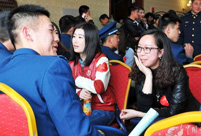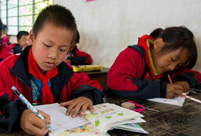 Geng Xuan crowned at 9th China Super Model Contest
Geng Xuan crowned at 9th China Super Model Contest
 Top 10 billionaires in the liquor industry
Top 10 billionaires in the liquor industry
 Ballerinas anywhere but onstage
Ballerinas anywhere but onstage
 Top 10 safest airlines in the world
Top 10 safest airlines in the world
 Top 10 most popular instant messaging apps in the world
Top 10 most popular instant messaging apps in the world
 Inspiring shadow images of Chinese army
Inspiring shadow images of Chinese army
 Models shine Xinjiang auto show
Models shine Xinjiang auto show
 From laid-off worker to int'l referee in bodybuilding
From laid-off worker to int'l referee in bodybuilding
 Selected photos of 'two sessions'
Selected photos of 'two sessions'
 Most unusual taxis around the world
Most unusual taxis around the world
The Japanese Cabinet on Tuesday approved new principles and guidelines on arms export, marking a major change on the war-renouncing country's defense stance for the first time in nearly half a century.
The newly adopted three principles on the transfer of defense equipment state that Japan will prohibit the export of weapons to countries involved in conflicts, and the new rules would also apply when exports violate United Nations resolutions.
With restrict screening, Japan will allow arms exports only if they serve the purpose of contributing to international cooperation and its security interests, according to the new rules.
The unstated use and transfer of Japanese equipment to third parties will also be kept in check.
Japan's original "three principles" on arms exports were adopted in 1967 and turned into a virtual blanket ban in 1976 and have been seen as a symbol of the country's pacifist stance.
The 1967 principles said Japan banned the transfer of weapons to communist states, countries subject to embargoes under UN resolutions and those involved in international conflicts.
Prime Minister Shinzo Abe, however, is eager to revise the country's defense and security policy and the new guidelines are one of his major policy goals.
The conservative leader is expected to decide whether to re- interpret the country's war-renouncing constitution to enable Japan to exercise the right to collective self-defense.
Japan's Defense Minister Itsunori Onodera said after a Cabinet meeting in which the new rules were approved Tuesday that Japan will actively facilitate cooperation on defense equipment and technology with other countries, especially with the United States.
Analysts here say that Abe's move on the new arms export rules and attempt to exercise collective self-defense right will change the country's post-war pacifist road based on it war-renouncing constitution.
They said that the new arms export policy actually opened the door for Tokyo to unlimitedly transfer weapons and military technology under the banner of "contribution to international peace" and "the need of national security."
The policy, in fact, has already jeopardized the country's pacifist stance as arms export has been considered as an important pillar of Japan's diplomacy, according to Shigeru Ishiba, secretary-general of Abe's ruling Liberal Democratic Party.
In his new book on collective self-defense right, Ishiba said arms export, among economic power and security capability, is a pillar of the country's diplomatic power.
Arms export by Japan could also trigger regional arms races and worsen regional disputes, analysts say.
As relations with its neighbors are frayed due to territorial disputes, Japan is seeking more military influence on the issues so as to show its tough stance, triggering vigilance from the neighboring countries on its moves.
South Korea, which is at odds with Japan on a pair of rocks in the Sea of Japan, on Tuesday called on Japan to have "the maximum level of transparency" in carrying out the new principles and guidelines on arms exports.
"As a pacifist nation, Japan is expected to adhere to basic principles and implement them into a direction of contributing peace and stability in the international community in a careful manner," said South Korean Foreign Ministry spokesman Cho Tai- young.
 Wonderful moment of China's airborne forces
Wonderful moment of China's airborne forces Bai Baihe shoots for fashion magazine
Bai Baihe shoots for fashion magazine Red terraced fields in Dongchuan of Yunnan
Red terraced fields in Dongchuan of Yunnan Jiaju Tibetan Village
Jiaju Tibetan Village Spring dating
Spring dating Confucius institute at UC Davis
Confucius institute at UC Davis Little painted faces at temple fair
Little painted faces at temple fair Top 10 safest airlines in the world
Top 10 safest airlines in the world Foreign students at China-Myanmar border
Foreign students at China-Myanmar border Ballerinas anywhere but onstage
Ballerinas anywhere but onstage Most unusual taxis around the world
Most unusual taxis around the world Micro-expression at 'two sessions'
Micro-expression at 'two sessions' Bridge Worship Festival in Taijiang, SW China
Bridge Worship Festival in Taijiang, SW China Hollywood documentary brings Diaoyu Islands truth to new audience
Hollywood documentary brings Diaoyu Islands truth to new audience Miss HK and actresses shine at flower show
Miss HK and actresses shine at flower showDay|Week|Month